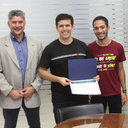Metabolic response and correlations between ions and metabolites in Phragmites communis under long-term salinity toxicity.
Märksõnad
Abstraktne
Phragmites communis has a long history in Songnen grassland of China and has a series of biological, ecological as well as genetic characteristics contributing to its adaptation to the specific local climatic and edaphic conditions. The aim of the present study was to investigate the ions balance and their relationship to metabolites in P. communis under three salinity stress conditions. Results showed that the contents of Na+, Cl-, and SO42- significantly increased in P. communis leaves, while K+, Mg2+, and Mn2+ decreased. Moreover, Na+ and Cl- had significant negative correlations with metabolites involved in the tricarboxylic acid cycle (TCA cycle), and significant positive correlations with glycolysis. The metabolite results showed that high contents of sugars and proline played important roles in developing salinity tolerance, indicating that glycolysis and proline biosynthesis were enhanced; however, this consumes large amounts of energy and likely caused the TCA cycle to be inhibited. The results suggested that P. communis might enhance its salinity tolerance mainly through increased glycolysis and energy consumption. In addition, restricting Na+ accumulation and increasing of Cl-, and rearrangement of metabolite production in P. communis tissues are possible causes of salinity tolerance. Therefore, salinity caused systems alterations in widespread metabolic networks involving TCA cycle, glycolysis and proline biosynthesis. These findings provided new insights for the P. communis metabolic adaptation to salinity and demonstrated the ions balance and metabolites in P. communis are possibly attributable to development of salinity tolerance.



